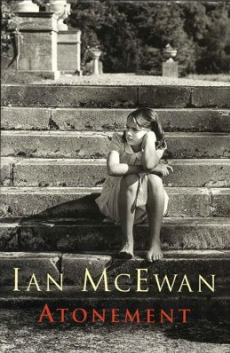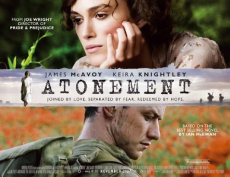
The 2001 novel ‘Atonement’, written by Author Ian McEwan, is widely regarded as one of his best works. A very interesting text, it explores the notion of family, loyalty, and, as the title suggests, how to correctly atone for past mistakes. The book is set in three separate time periods, England 1935, WW2 in both France and England, and present day England (well, 1999). Readers are also provided with two different central characters, the arguable protagonists of the novel, Briony Tallis, and Robbie Turner. The character of Cecilia Tallis, older sister to Briony, also plays a vital role in the novel - but McEwan does not permit her to directly speak with the reader. Still, the text is a highly thought-provoking study of specific values and ideas; the backdrop of a war making the tensions presented all the more taxing.
The story begins with thirteen-year-old Briony Tallis, describing her latest work of fiction. A play grandly titled ‘The trials of Arabella’- the story of a young girl who sins, and is punished, before vowing to be a good person, and thereby being rewarded by God. Perhaps, hinting a little at the actual novel’s plot. Whilst the novel, save the epitaph, is written in third person, the focus on either Briony or Robbie allowing a story to be told without the bias of a direct narrative. This is cleverly used by McEwan - it means that the readers are kept at a slight distance from the characters that are the focus of the novel, so their development can be observed. Another interesting choice made is that the novel’s blurb, its cover, and the cover and posters for the 2007 film version all seem to focus on Robbie, suggesting it is he who must atone for whatever he has done. However, this is not the case; Briony, a seemingly secondary character from all external descriptions of the text, is the true centre point.

The novel, which is certainly strong in many areas, does, however, have a few weak points. For one, it seems that the character of Cecilia Tallis would have added more to the story, providing not only a third perspective, but also perhaps filling in some of the blanks in time left by the author. The random skips in time, with little or no explanation as to the events that occurred in between, also present a slight issue, causing the text to seem slightly disjointed. However, (spoiler alert) the final chapter reveals the author of the previous sections to be an aged Briony, who is suffering from dementia. The slightly clunky feeling between each time period may be a reference to her deteriorating memory, how it seems that reality is slowly slipping away.
‘Atonement’ is not a happy book. It is full of lies, and war, and is, on the whole, very melancholy. Nevertheless, it is certainly well written. Some of the creative decisions made by McEwan are not necessarily outstanding- but his language definitely is. The unfinished nature of the book, whilst frustrating, does leave the reader to think, perhaps considering how to atone, themselves.
Image: https://upload.wikimedia.org/wikipedia/en/e/e4/Atonement_UK_poster.jpg
https://upload.wikimedia.org/wikipedia/en/6/6d/Atonement_(novel).jpg

0 Comment:
Be the first one to comment on this article.